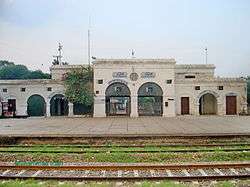Farooqabad
Farooqabad (Urdu: فارُوق آباد), earlier known as Choorkana "(چوڑ کانا)" is a city in Sheikhupura District, Punjab, Pakistan. It is situated along the twin canals (Qadirabad Balloki Link Canal and Upper Gogera Branch Canal) about 55 km west of Lahore on Sargodha Road along Lahore-Islamabad M-2 Motorway and on Lahore-Faisalabad-Karachi Main Railway Line.[1]
Farooqabad | |
|---|---|
city | |
 Farooqabad Railway Station built during the British Rule around nineteenth century. | |
| Coordinates: 31.74430°N 73.83342°E | |
| Country | Pakistan |
| Province | Punjab |
| District | Sheikhupura |
| Named for | Umar |
| Government | |
| • MNA | Muhammad Irfan Dogar (Pakistan Muslim League (N)) |
| Elevation | 210 m (690 ft) |
| Population (2017) | |
| • Total | 77,706 |
| Time zone | UTC+5 (PST) |
| Calling code | 056 |
| Website | apnafarooqabad |
History
Sheikhupura District, where Farooqabad is located, has been an agricultural region having dense forests ever since the Indus Valley Civilization some 5 thousand years ago. The Vedic period is characterized by Indo-Aryan culture that invaded from Central Asia and settled in Punjab region. The Kambojas, Daradas, Kaikayas, Madras, Pauravas, Yaudheyas, Malavas and Kurus invaded, settled and ruled this ancient Punjab region. After overrunning the Achaemenid Empire in 331 BCE, Alexander marched into present-day Punjab region with an army of 50,000. Sheikhupura was ruled by Maurya Empire, Indo-Greek kingdom, Kushan Empire, Gupta Empire, White Huns, Kushano-Hephthalites and Shahi kingdoms and then the British in recent times.
In 1005 AD, Sultan Mahmud Ghaznavi conquered the Punjab region including this area. The Delhi Sultanate and later Mughal Empire ruled the region. The Punjab region became predominantly Muslim due to the influence of missionary Sufi saints whose dargahs dot the landscape of Punjab region.
After the decline of the Mughal Empire, the Sikh Empire under Maharajah Ranjit Singh created a secular kingdom in the Punjab. The first police station, in Farooqabad, was set up during the British rule in 1924 and is called Sadar Thana Farooqabad. Steady growth followed as students came in from all parts of the Punjab and North West India. The predominantly Muslim population supported Muslim League and the Pakistan Movement. After the independence of Pakistan in 1947, the minority Hindus and Sikhs in Farooqabad area migrated to India while the Muslim refugees from India settled in the Farooqabad region. In recent times, 'Sikh Yatrees' (Sikh visitors) regularly come to visit their sacred places like Sucha Sauda in the Farooqabad area from all over the world.[2]
Specialty
This city has long remained the house of a large number of people belonging to Sikh Religion prior to Partition of India. At the time of partition, most of the Sikh families moved to Indian Punjab fearing their lives and property. But their cultural sites in Farooqabad still remain a specialty of this city. Moreover, this city is famous for its Punjab Police (Pakistan) training center.[3]
Moreover, the Pakistan Adventist Seminary and College (PASC) developed from a small Seventh-day Adventist Boys' School was founded in 1920 by the British. In 1937, it became a co-educational institution with the integration of the Seventh-day Adventist Girls' School.[4]
Among the very few, this city also hosts one of the biggest Fountain House in Pakistan.[5]
Census history
| Year | Population |
|---|---|
| 1961 | 8682 |
| 1972 | 15146 |
| 1981 | 34995 |
| 1998 | 57601 |
| 2017 | 77706 |
References
- Farooqabad on GoogleMaps, Retrieved 13 July 2017
- Sikh Yatrees visit Sucha Sauda (sacred place) near Farooqabad, Published 11 November 2016, Retrieved 13 July 2017
- "Training Branch | Punjab Police". www.punjabpolice.gov.pk. Retrieved 2020-01-15.
- "Pakistan Adventist Seminary & College". www.pasc.edu.pk. Retrieved 2020-01-15.
- "Fountain House Farm Farooqabad". Retrieved 2020-01-15.
External links
- Farooqabad on the WikiMapia